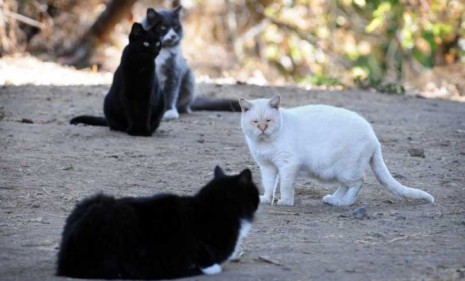The 'cat lady' who beat the IRS
It turns out you can write off the thousands of dollars you spent caring for dozens of feral cats... and other charitable expenses

A free daily email with the biggest news stories of the day – and the best features from TheWeek.com
You are now subscribed
Your newsletter sign-up was successful
Animal lovers, rejoice! In what's being called a "great victory for animal rescuers nationwide," an Oakland, Calif. "cat lady" battled the IRS, and won. Jan Van Dusen emerged victorious from a tax-court trial over deductions related to the care she gave 70 stray and feral cats. The ruling is being heralded as precedent-changing, not only for volunteers in animal rescue, but all volunteers who spend their money to do good. Here, a brief guide to the case:
What exactly did Van Dusen do?
The 59-year-old former family-law lawyer, who lives alone in Oakland, Calif., volunteers for an IRS-approved charity called Fix Our Ferals. As a volunteer, she provided foster care to some 70 feral cats, as well as housing seven cats of her own, much to the chagrin of some of her neighbors.
The Week
Escape your echo chamber. Get the facts behind the news, plus analysis from multiple perspectives.

Sign up for The Week's Free Newsletters
From our morning news briefing to a weekly Good News Newsletter, get the best of The Week delivered directly to your inbox.
From our morning news briefing to a weekly Good News Newsletter, get the best of The Week delivered directly to your inbox.
Why did the IRS take her to court?
On her 2004 tax return, Van Dusen tried to claim $12,068 in expenses related to her cat rescue work: Money she spent on cat food, vet bills, garbage bags, and paper towels, among other things. The IRS said the expenses were personal, and not deductible. In 2009, the case ended up in tax court. Unfamiliar with tax law but unable to afford a lawyer, Van Dusen represented herself. Judge Richard Morrison patiently went through Van Dusen's receipts, and asked probing legal questions like, "What were these paper towels used for?"
What was the judge's ruling?
In a 42-page decision released earlier this month, Judge Morrison (mostly) sided with Van Dusen, allowing most of her deductions, because the expenses were incurred helping a charitable organization achieve its mission. Van Dusen's total deduction was lessened somewhat — by an undisclosed amount — because she didn't have a letter from Fix Our Ferals acknowledging her work (required for expenses of $250 or more). The lesson here? "Get the letter. Get the letter. Get the letter," says Laura Saunders in The Wall Street Journal. "That should be the mantra of taxpayers who make charitable gifts of $250 or more."
A free daily email with the biggest news stories of the day – and the best features from TheWeek.com
Do animal rescuers typically spend as much as Van Dusen?
It's not uncommon. The Humane Society says many of its volunteers spend as much as $2,000 a year to help needy animals, and some spend upwards of $15,000.
What are the implications of the decision?
The case sets a "precedent for animal rescuers nationwide," says Vania Maldonado at Examiner.com. But it's not just animal lovers who win here, says Sanders. The case provides "some needed clarity" for those who volunteer for any of the 1.55 million IRS-recognized charities, and have unreimbursed expenses, especially those related to the use of one's home. Accountants have typically advised clients not to try and take such deductions, but now "if you host and pay for a catered fundraiser in your home, we know what to do," says Laura Peebles who works with Deloitte Tax.
Sources: Examiner.com, Wall Street Journal (2)